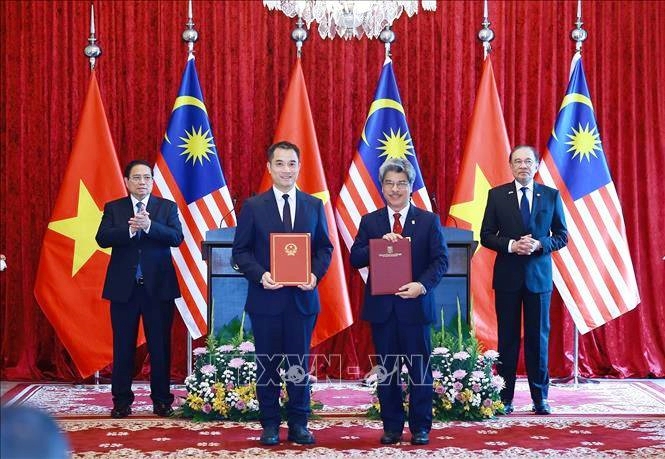 |
As a member of the Vietnamese Prime Minister’s delegation to Malaysia. VNU Vice President Assoc. Prof. Dr. Pham Bao Son and UKM Acting Vice-Chancellor Prof. Abdul Halim Abdul Gafor formally exchanged the cooperation documents on behalf of the two universities.
The cooperation documents between the two leading national universities of Vietnam and Malaysia aim to develop practical forms of collaboration that contribute to the integration and sustainable development of the ASEAN Community. Accordingly, the two universities will jointly conduct research and academic supervision, as well as publish in-depth publications on ASEAN integration and the implementation of the ASEAN Vision 2045 and the Strategic Plans for the ASEAN, with a focus on the three pillars: Political Security Community, ASEAN Economic Community, and the ASEAN Sociocultural Community.
Both sides agreed to develop joint training programs for researchers, lecturers, students and policy makers through exchange programs, professional certifications, as well as the online learning platform GLOBALASEAN.org being developed by IKMAS UKM.
The National University of Malaysia, one of the most prestigious and long-established educational institutions in Malaysia and Southeast Asia, had the honor of welcoming General Secretary To Lam during his official visit to Malaysia in November 2024. As part of the visit, the General Secretary delivered an important speech at the university, emphasizing the pivotal role of education in strengthening cooperation and mutual understanding between the two nations.
The cooperation agreement between VNU and UKM is a concrete step toward implementing the strategic direction for educational and scientific & technological collaboration between Vietnam and Malaysia. It also affirms the vital role of higher education institutions in supporting the two governments in fostering regional integration and contributing to the realization of the ASEAN Community Vision 2045. The partnership between these two leading universities, as well as broader bilateral educational cooperation, especially in higher education, serves as a powerful pillar that fosters deeper, more substantive ties between the two countries in the years to come.
